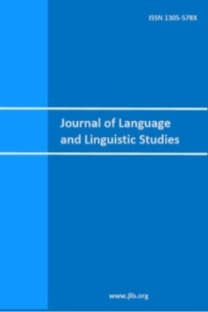The effect of school type on EFL teachers’ burnout: The case in Turkey
professional burnout; EFL teachers; teaching English; school type; primary school
___
Atmaca, Ç. A burning issue among English teachers: Reflections of in-service teachers on job satisfaction and burnout. ELT Research Journal, 6(1), 89-115.Bakker, A. B., Schaufeli, W. B., Leiter, M. P., &Taris, T. W. (2008). Work engagement: An emerging concept in occupational health. Work & Stress: An International Journal of Work, Health & Organisations, 22(3), 187-200.
Byrne, B. (1999). The nomological network of teacher burnout: a literature review and empirically validated model. In R. Vandenberghe and A.M. Huberman (Eds.),Understanding and preventing teacher burnout: A sourcebook of international research and practice (pp.15-37). Cambridge, UK: Cambridge University Press.
Farber, B. A. (1991). Crisis in education: Stress and burnout in the American teacher. San Francisco: Jossey-Bass.
Freudenberger, H. J. (1974). Staff burnout. Journal of Social Issues, 30, 159-165.
Friedman, I. A. (1991). High- and low-burnout schools: School culture aspects of teacher burnout. The Journal of Educational Research, 84, 6.
Gaitan, P. (2009). Teacher Burnout Factors as Predictors of Adherence to Behavioral Intervention. Doctoral dissertation, University of Minnesota.
Genç, G. (2016). Learned resourcefulness and burnout levels of English teachers. International Journal of Psychology and Educational Studies, 3(1), 1-13.
Gold, Y. & Grant, R.A. (1993). Teachers managing stress and preventing burnout: The professional health solution. London: Falmer.
Guskey, T. R. (1988). Teacher efficacy, self-concept, and attitudes toward the implementation of instructional innovation. Teaching and teacher education, 4(1), 63-69.
Hismanoglu, M., & Ersan, Y. (2016). Investıgating Turkish EFL teachers' burnout levels in relation to demographic variables. Journal of Educational & Instructional Studies in the World, 6(4).
Horn, J.E. van &Schaufeli, W.B. (1998). Maslach Burnout Inventory: The Dutch Educators Survey (MBI-NLES) Psychometric evaluations. Manual (unpublished manuscript). Utrecht University: Department of Social and Organizational Psychology.
Hughes, R. E. (2001). Deciding to leave but staying: teacher burnout, precursors and turnover. The International Journal of Human Resource Management, 12(2), 288-298.
Kurtoğlu, Ü. (2001) An evaluation of ELT teachers’ vocational burnout according to some variables, Unpublished master’s Thesis, Kafkas University, Kars, Turkey.
Küskü, F. (2001). Dimensions of employee satisfaction: A state university example. METU Studies in Development, 28 (3-4), 2001, 399-430, ISSN 1362-0436.
Kyriacou, C. (2001). Teacher stress: directions for future research. Educational Review, 53(1), 27-35.
Maslach, C., & Jackson, S. E. (1981). The measurement of experienced burnout. Journal of Occupational Behavior, 2, 99-113.
Maslach, C. (1982). Burnout: The cost of caring. New York: Prentice-Hall.
Maslach, C., & Jackson, S.E. (1986). MBI: Maslach Burnout Inventory, Manuel Research Edition. Palo Alto, CA: Consulting Psychologists Press.
Maslach, C., Jackson, S.E., & Leiter, M.P. (1996). MBI: The Maslach Burnout Inventory: Manual, Consulting Psychologists Press, Palo Alto, CA, 4-20.
Maslach, C., Jackson, S. E., Leiter, M. P., Zalaquett, C., & Wood, R. (1997). Evaluating stress: A book of resources. 3. USA: Scarecrow.
Maslach, C. (1999). Progress in understanding teacher burnout. In R. Vandenberghe and A.M. Huberman (Eds.), Understanding and preventing teacher burnout: A sourcebook of international research and practice. (pp.211-222). Cambridge, UK: Cambridge University Press.
Maslach, C., Schaufeli, W. B., & Leiter, M. P. (2001). Job burnout. Annual Review Psychology, 52, 397-422.
Russell, D. W. E., Altmaier, D., & Van, V. (1987). “Job-related stress, social support, and burnout among classroom teachers”. Journal of Applied Psychology, vol. 72, p. 269-274.
Shirom, A. (1989). Burnout in work organizations. In C. L. Cooper & I. Robertson (Eds.) International Review of Industrial and Organizational Psychology, (pp.26-48). N.Y: Wiley.
Taris, T. W., Le Blanc, P. M., Schaufeli, W. B. &Schreurs, P. J. G. (2005). Are there causal relationships between the dimensions of the Maslach Burnout Inventory? A review and two longitudinal tests. Work & Stress, 19, 238 – 255.
Uğuz, S. (2016). A study on the professional burnout of EFL teachers at vocational and technical Anatolian high schools in Adana. Unpublished Master’s Thesis, Çukurova University, Adana, Turkey.
Wong, E., &Heng, T.N. (2009). Case study of factors influencing jobs satisfaction in two Malaysian Universities. International Business Research, Vol.2, No: 2.
Yorulmaz, Y. İ., & Altınkurt, Y. (2018). The examination of teacher burnout in Turkey: A meta-analysis. Turkish Journal of Education, 7(1), 34-54. DOI: 10.19128/turje.348273.
- ISSN: 1305-578X
- Yayın Aralığı: Yılda 4 Sayı
- Yayıncı: Hacettepe Üniversitesi
Burçak YILMAZ YAKIŞIK, Fatıma Nur FİŞNE, Gonca YANGIN EKŞİ
Code-switching in tertiary-level EFL classrooms: perceptions of teachers
Peer editing as a way of developing ELT students’ writing skills: An action research
Washback effect of Turkish foreign language proficiency exam YDS: A scale development study
Do + subjunctive, future reference and modality in Albanian
Learning from reflection: A case of a post-sojourn debriefing workshop with EFL university students
Keziban TEKŞAN, Hasan Hüseyin MUTLU, Enes ÇİNPOLAT
The prospective EFL teachers' impressions towards teaching styles: Foresights for their professions
Ayfer SU BERGİL, Ayşegül ERÇEVİK
Developing intercultural awareness in language teaching: Insights from EFL lecturers in Turkey
